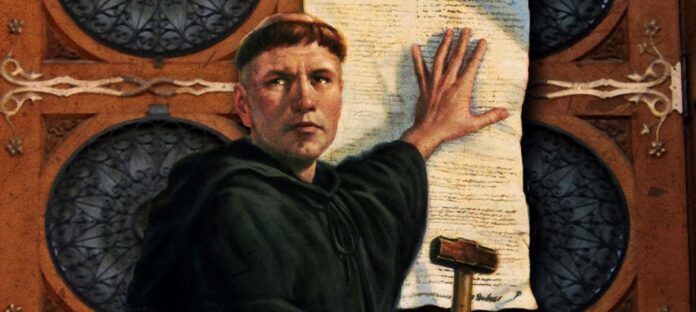
Five hundred years ago, in January 1521, Martin Luther was excommunicated by Pope Leo X, and Protestantism began. According to Pew Research, an American statistics site, today the Christian religion is the most widespread in the world. It is followed by 31.50% of the population, i.e, 2.2 billion faithful about. 22% of them, i.e. 480 million people are Protestants living in the most industrialized countries in the world, such as the USA, Germany, northern European countries, etc …
It has been told that the protest was caused by religious and political matters. In fact, Protestantism resulted useful to the German princes who wanted to conquer the vast territories belonging to the Catholic clergy in Germany. Also they planned a German state identity. By doing so, thanks to the Augusta Peace (1555), the liberty for worship was recognized. That according the principle cuius regio eius religio which allowed the subjects to practice their own prince’s religion.That principle was first used by Switzerland after the defeat of Zwingli in 1531.
The new religious belief was based on the direct relationship between the faithful and the Holy Scriptures without the mediation of magisterium and tradition, on the predestination which stated the primacy of grace over merit, and of faith itself over works. That new religious belief resulted successful in the most economically developed areas in the world. Actually, it perfectly met the individual desire for progress and enrichment, as first highlighted by the philosopher and economist Max Weber in his book titled The Protestant Ethics and the Spirit of Capitalism. In fact, the richness coming from land possession, for Protestantism means divine favor, a sign of grace and predestination to eternal life.
Beyond any theological critical judgment on how much the new principles were founded, as far as the historical, economic and sociological fields are concerned, you should admit that Luther’s Protestant Reformation brought a wave of religious freedom and therefore of broadening the spiritual and ethical horizons of peoples, especially by valuing individualism as an engine of progress and development.
The philosophical-political-economic theory of individualism was then codified by De Mandeville, Smith, Hume, Mill, Weber, Popper and others. The need for the recognition of the rights of each individual human being, is tied to individualism. You find those rights in the modern laws and modern Constitutions of democratic states, even if they are tempered by community’s social needs. Thanks to all this, still today we can enjoy the richness in different countries, including Italy.
Cinquecento anni fa, nel gennaio 1521, Martin Lutero veniva scomunicato dal papa Leone X, e iniziava il protestantesimo. Secondo Pew Research, sito americano di statistica, ad oggi, nel mondo, la religione cristiana è la più diffusa, perché riconosciuta dal 31,50% della popolazione, pari a circa 2,2 miliardi di fedeli. Di questi il 22 % circa, pari a 480 milioni di persone, sono protestanti, diffusi nei Paesi più industrializzati del mondo, come Usa, Germania, Paesi del nord Europa, ecc…
È noto che l’origine della protesta fosse di carattere religioso e anche politico. Infatti, il protestantesimo è servito ai principi tedeschi per impossessarsi dei vasti territori appartenenti al clero cattolico in Germania, fondare un’identità statuale germanica, contrapporsi unitariamente all’imperatore Carlo V, fino ad ottenere con la pace di Augusta (1555) il riconoscimento della libertà di culto, sulla base del principio cuius regio eius religio (principio adottato per primo dalla Svizzera dopo la sconfitta di Zwingli nel 1531), che riconosceva il diritto dei sudditi di seguire la religione del proprio principe.
Tuttavia, il nuovo credo religioso – basato sul diretto rapporto tra fedele e Sacre Scritture senza mediazione di magistero e tradizione, sulla predestinazione che stabiliva il primato della grazia sul merito, e della fede stessa sulle opere – ha incontrato il successo nelle aree del mondo più sviluppate economicamente perché si sposava, e si sposa, perfettamente con il desiderio individuale di progresso e arricchimento, come evidenziato per primo dal filosofo ed economista Max Weber nel suo celebre libro L’Etica protestante e lo spirito del capitalismo. Infatti, la ricchezza posseduta sulla terra, per il protestantesimo è indice di favore divino, segno di grazia e predestinazione alla vita eterna.
Al di là di ogni giudizio critico teologico sulla fondatezza dei nuovi principi, non si può disconoscere, sul piano storico, economico e sociologico, che la Riforma protestante di Lutero abbia portato una ventata di libertà religiosa e dunque di ampliamento degli orizzonti spirituali ed etici dei popoli, soprattutto valorizzando l’individualismo come motore di progresso e sviluppo. La teoria filosofico-politico-economica dell’individualismo è stata poi codificata da De Mandeville, Smith, Hume, Mill, Weber, Popper ed altri. Ed è all’individualismo – da cui nasce l’esigenza del riconoscimento dei diritti di ciascun singolo essere umano, presenti nelle leggi e nelle Costituzioni moderne degli Stati democratici – sia pure temperato dalle esigenze sociali di comunità, che in fondo dobbiamo ancora oggi la ricchezza diffusa in molti Paesi, compreso il nostro.







